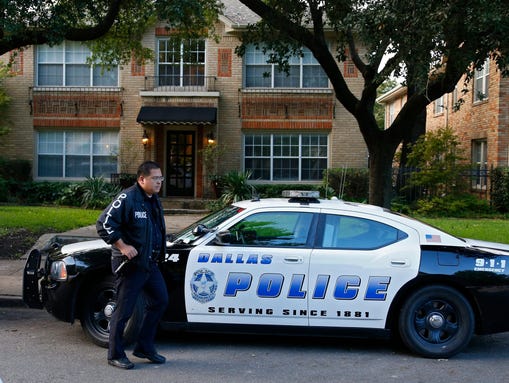'Breach in protocol' caused second U.S. Ebola infection
A Dallas health care worker who provided care for the Ebola patient who died there last week tested positive for the deadly virus, and sent health officials scrambling Sunday to determine the "breach in protocol" that resulted in her infection.
The woman was among caregivers for Thomas Eric Duncan, who died Wednesday at Texas Health Presbyterian Hospital.
Thomas Frieden, head of the Centers for Disease Control and Prevention, said Sunday his agency will investigate how a worker in full protective gear contracted the virus.
"At some point there was a breach in protocol," Frieden said. "That breach in protocol resulted in this infection."
Frieden cited four steps being taken by the CDC: ensuring the woman is cared for safely; identifying her contacts; treating all health care workers who cared for Duncan as having potentially been exposed; and reviewing procedures used to protect health care workers who treat Ebola patients.
Frieden called the positive test "very concerning" but stressed that the protocols for caring for Ebola patients are safe if done properly. He said that removing the gear incorrectly, for example, raises risk.
"This tells us there is a need to enhance training and to make sure protocols are followed," he said. He said the CDC will study ways to reduce the number of health care workers involved in treatment, to reduce medical procedures — noting that kidney dialysis, for example, could increase risk — and to provide on-site monitoring to ensure that protocols are followed.
Sen. John McCain, R-Ariz., speaking on CNN's State of the Union, said the U.S. needs "some kind of czar" to take charge of the Ebola response. "Americans have to be reassured," McCain said.
The woman reported having a fever Friday night and was hospitalized, isolated and referred for testing within 90 minutes, Clay Jenkins, Dallas County's chief executive and its Homeland Security director, said at a news conference.
"While this is obviously bad news, it is not news that should bring about panic," Jenkins said. "We knew it was a possibility that a second person would contract the virus. We had a contingency plan in place."
The woman, who requested anonymity, was listed in stable condition, Jenkins said.
Dan Varga, chief clinical officer for the hospital group that includes Texas Health Presbyterian, confirmed that the woman had worn full protective gear when working with Duncan.
Duncan was the first person diagnosed with Ebola in the United States.
The health care worker is among a few dozen who had contact with Duncan and were self-monitoring — watching for symptoms consistent with early signs of Ebola, Varga said. The monitoring guidelines include taking a temperature twice a day.

Dallas Police stand watch outside the apartment where a health care worker at Texas Health Presbyterian Hospital lives and tested positive for Ebola on Saturday. -- (Photo: Larry W. Smith, epa)
"That health care worker is a heroic person," Jenkins said. "Let's remember as we do our work that this is a real person who is going through a great ordeal, and so is that person's family."
Last week, the hospital defended the quality of care it provided Duncan, saying treatment was not affected by the man's nationality or lack of health insurance.
The hospital had released a written statement Thursday in response to questions raised around the world about the treatment Duncan, 42, received, saying it wanted "to correct some misconceptions.''
"Our care team provided Mr. Duncan with the same high level of attention and care that would be given any patient, regardless of nationality or ability to pay for care,'' the hospital said in a statement from its director of public relations, Wendell Watson.
"In this case, that included a four-hour evaluation and numerous tests,'' he said. "We have a long history of treating a multicultural community in this area.''
Tougher screening for Ebola began Saturday at New York's Kennedy Airport. Agents with the Department of Homeland Security's Customs and Border Protection screened travelers from Guinea, Liberia and Sierra Leone, taking their temperature and observing them for other Ebola symptoms. The program will be added at four more U.S. airports in coming days.
Ebola is spread through direct contact with bodily fluids of a sick person or exposure to contaminated objects such as needles. People are not contagious before symptoms such as fever develop.
Source - http://www.usatoday.com/story/...rker-ebola/17147449/
